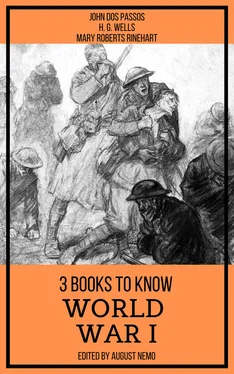As he was leaving the hut, pressed in a tight stream of soldiers moving towards the door, Andrews heard a man say:
“I never raped a woman in my life, but by God, I'm going to. I'd give a lot to rape some of those goddam German women.”
“I hate 'em too,” came another voice, “men, women, children and unborn children. They're either jackasses or full of the lust for power like their rulers are, to let themselves be governed by a bunch of warlords like that.”
“Ah'd lahk te cepture a German officer an' make him shine ma boots an' then shoot him dead,” said Chris to Andrews as they walked down the long row towards their barracks.
“You would?”
“But Ah'd a damn side rather shoot somebody else Ah know,” went on Chris intensely. “Don't stay far from here either. An' Ah'll do it too, if he don't let off pickin' on me.”
“Who's that?”
“That big squirt Anderson they made a file closer at drill yesterday. He seems to think that just because Ah'm littler than him he can do anything he likes with me.”
Andrews turned sharply and looked in his companion's face; something in the gruffness of the boy's tone startled him. He was not accustomed to this. He had thought of himself as a passionate person, but never in his life had he wanted to kill a man.
“D'you really want to kill him?”
“Not now, but he gits the hell started in me, the way he teases me. Ah pulled ma knife on him yisterday. You wasn't there. Didn't ye notice Ah looked sort o' upsot at drill?”
“Yes... but how old are you, Chris!”
“Ah'm twenty. You're older than me, ain't yer?”
“I'm twenty-two.”
They were leaning against the wall of their barracks, looking up at the brilliant starry night.
“Say, is the stars the same over there, overseas, as they is here?”
“I guess so,” said Andrews, laughing. “Though I've never been to see.”
“Ah never had much schoolin',” went on Chris. “I lef school when I was twelve, 'cause it warn't much good, an' dad drank so the folks needed me to work on the farm.”
“What do you grow in your part of the country?”
“Mostly coan. A little wheat an' tobacca. Then we raised a lot o' stock.... But Ah was juss going to tell ye Ah nearly did kill a guy once.”
“Tell me about it.”
“Ah was drunk at the time. Us boys round Tallyville was a pretty tough bunch then. We used ter work juss long enough to git some money to tear things up with. An' then we used to play craps an' drink whiskey. This happened just at coan-shuckin' time. Hell, Ah don't even know what it was about, but Ah got to quarrellin' with a feller Ah'd been right smart friends with. Then he laid off an' hit me in the jaw. Ah don't know what Ah done next, but before Ah knowed it Ah had a hold of a shuck-in' knife and was slashin' at him with it. A knife like that's a turruble thing to stab a man with. It took four of 'em to hold me down an' git it away from me. They didn't keep me from givin' him a good cut across the chest, though. Ah was juss crazy drunk at the time. An' man, if Ah wasn't a mess to go home, with half ma clothes pulled off and ma shirt torn. Ah juss fell in the ditch an' slep' there till daylight an' got mud all through ma hair.... Ah don't scarcely tech a drop now, though.”
“So you're in a hurry to get overseas, Chris, like me,” said Andrews after a long pause.
“Ah'll push that guy Anderson into the sea, if we both go over on the same boat,” said Chrisfield laughing; but he added after a pause: “It would have been hell if Ah'd killed that feller, though. Honest Ah wouldn't a-wanted to do that.”
“That's the job that pays, a violinist,” said somebody.
“No, it don't,” came a melancholy drawling voice from a lanky man who sat doubled up with his long face in his hands and his elbows resting on his knees. “Just brings a living wage... a living wage.”
Several men were grouped at the end of the barracks. From them the long row of cots, with here and there a man asleep or a man hastily undressing, stretched, lighted by occasional feeble electric-light bulbs, to the sergeant's little table beside the door.
“You're gettin' a dis-charge, aren't you?” asked a man with a brogue, and the red face of a jovial gorilla, that signified the bartender.
“Yes, Flannagan, I am,” said the lanky man dolefully.
“Ain't he got hard luck?” came a voice from the crowd.
“Yes, I have got hard luck, Buddy,” said the lanky man, looking at the faces about him out of sunken eyes. “I ought to be getting forty dollars a week and here I am getting seven and in the army besides.”
“I meant that you were gettin' out of this goddam army.”
“The army, the army, the democratic army,” chanted someone under his breath.
“But, begorry, I want to go overseas and 'ave a look at the 'uns,” said Flannagan, who managed with strange skill to combine a cockney whine with his Irish brogue.
“Overseas?” took up the lanky man. “If I could have gone an' studied overseas, I'd be making as much as Kubelik. I had the makings of a good player in me.”
“Why don't you go?” asked Andrews, who stood on the outskirts with Fuselli and Chris.
“Look at me... t. b.,” said the lanky man.
“Well, they can't get me over there soon enough,” said Flannagan.
“Must be funny not bein' able to understand what folks say. They say 'we' over there when they mean 'yes,' a guy told me.”
“Ye can make signs to them, can't ye?” said Flannagan “an' they can understand an Irishman anywhere. But ye won't 'ave to talk to the 'uns. Begorry I'll set up in business when I get there, what d'ye think of that?”
Everybody laughed.
“How'd that do? I'll start an Irish House in Berlin, I will, and there'll be O'Casey and O'Ryan and O'Reilly and O'Flarrety, and begod the King of England himself'll come an' set the goddam Kaiser up to a drink.”
“The Kaiser'll be strung up on a telephone pole by that time; ye needn't worry, Flannagan.”
“They ought to torture him to death, like they do niggers when they lynch 'em down south.”
A bugle sounded far away outside on the parade ground. Everyone slunk away silently to his cot.
John Andrews arranged himself carefully in his blankets, promising himself a quiet time of thought before going to sleep. He needed to be awake and think at night this way, so that he might not lose entirely the thread of his own life, of the life he would take up again some day if he lived through it. He brushed away the thought of death. It was uninteresting. He didn't care anyway. But some day he would want to play the piano again, to write music. He must not let himself sink too deeply into the helpless mentality of the soldier. He must keep his will power.
No, but that was not what he had wanted to think about. He was so bored with himself. At any cost he must forget himself. Ever since his first year at college he seemed to have done nothing but think about himself, talk about himself. At least at the bottom, in the utterest degradation of slavery, he could find forgetfulness and start rebuilding the fabric of his life, out of real things this time, out of work and comradeship and scorn. Scorn—that was the quality he needed. It was such a raw, fantastic world he had suddenly fallen into. His life before this week seemed a dream read in a novel, a picture he had seen in a shop window—it was so different. Could it have been in the same world at all? He must have died without knowing it and been born again into a new, futile hell.
When he had been a child he had lived in a dilapidated mansion that stood among old oaks and chestnuts, beside a road where buggies and oxcarts passed rarely to disturb the sandy ruts that lay in the mottled shade. He had had so many dreams; lying under the crepe-myrtle bush at the end of the overgrown garden he had passed the long Virginia afternoons, thinking, while the dryflies whizzed sleepily in the sunlight, of the world he would live in when he grew up. He had planned so many lives for himself: a general, like Caesar, he was to conquer the world and die murdered in a great marble hall; a wandering minstrel, he would go through all countries singing and have intricate endless adventures; a great musician, he would sit at the piano playing, like Chopin in the engraving, while beautiful women wept and men with long, curly hair hid their faces in their hands. It was only slavery that he had not foreseen. His race had dominated for too many centuries for that. And yet the world was made of various slaveries.
Читать дальше












